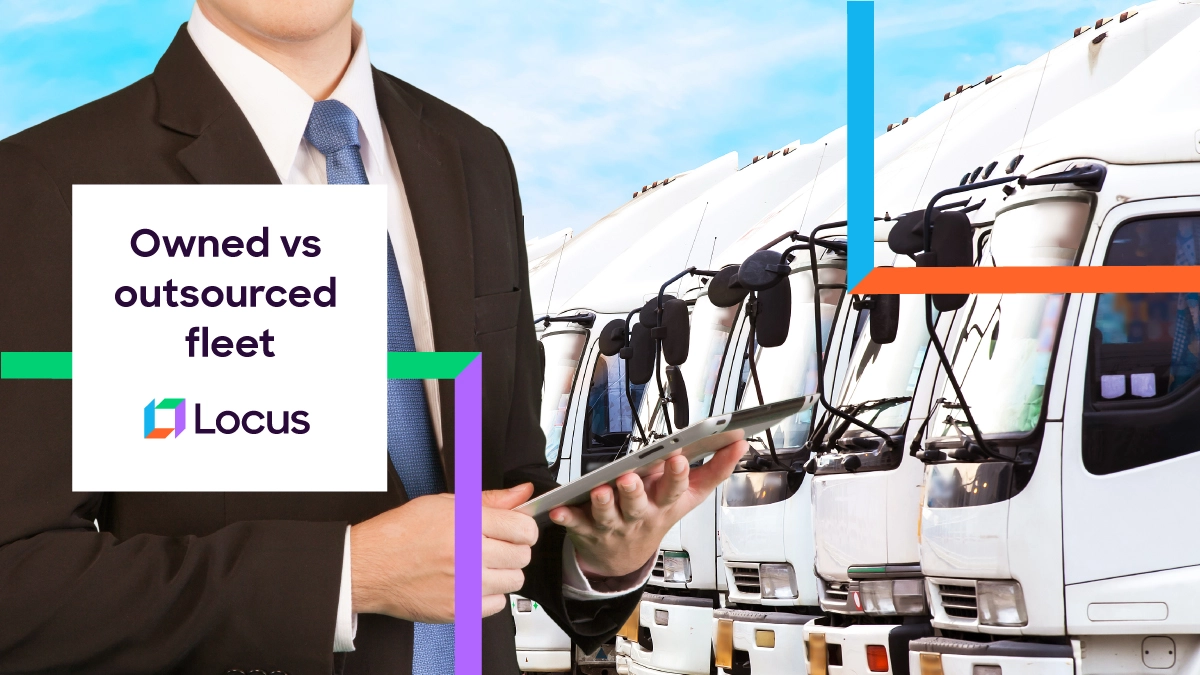Fleet Optimization
Owned Vs Outsourced Fleet: What’s Best for Your Fast Retail Business
Sep 13, 2022
9 mins read

For decades, Walmart has been the undisputed front-runner in US retail sales. One of the major factors that contributed to its success is its tight control over its retail logistics. As a result, it holds a comfortable edge over its competitors like Kroger, Costco or Target due to its profitable fleet mix decisions.
While making fleet mix decisions for the last mile, retail businesses face an important question: Which way is best for a retail business? Owned or outsourced fleet? Let’s jump right in to seek answers to this crucial question.
Owned vs. Outsourced fleet: The dilemma for retail businesses

Owning a transport fleet for meeting last-mile delivery needs was a proposition that many retail businesses avoided until the COVID-19 pandemic struck.
Amid lockdown restrictions and driver shortages, many companies relied entirely on the outsourced fleet during these chaotic times. However, challenges like delayed deliveries, volatility in freight volumes, and lack of flexibility to scale deliveries made it difficult for outsourcers to fulfill shipments on time. These challenges led retailers to consider owned fleets for their last mile. But there was a downside to this choice too.
To own a fleet, you require high initial capital around infrastructure, labor, and finance. You have to solely hold liability for any damage of goods, unanticipated delays, or failed deliveries. The trickiest piece in handling owned fleets is to manage the cost and convenience of deliveries.
Retail businesses that need the best of in-house and outsourced fleets are opting for hybrid fleet models. But managing hybrid fleets has its own share of challenges, like handling contingencies and managing capacity shortages during seasonal peaks.
With unexpected volatilities in customer demand and a shortage in capacity, it is getting harder for businesses to find the optimal fleet mix.
Download our whitepaper to know how to choose between in-house and outsourced fleet through varied and detailed scenarios?
Factors that determine whether retail businesses should opt for owned or outsourced fleet

Being a retail business, you might have heard a lot of noise made from multiple directions on this question, and we understand that might be puzzling about whether to opt for an owned or outsourced fleet. But don’t worry: You are not alone.
Want to know the difference between in-house and outsourced fleet management? Read now!
Before finalizing your fleet management approach, it is crucial to understand the factors that determine them. This would help avoid the confusion you face while making this decision.
- Delivery volumes
The decision to opt for an owned or outsourced fleet depends on the delivery volumes you deal with daily.
The most important question to ask is whether you handle enough delivery volumes that can keep your resources engaged. It becomes highly expensive for your business to recruit and manage drivers for a full working shift, especially when most deliveries take place in a small time frame, often just two hours in a day. To keep your in-house team operational at full capacity, you require accurate predictability in demand.
You can opt for an owned fleet if you have enough delivery volumes flowing throughout the day that can engage your resources for a long working time. Else, it is optimal to choose outsourced fleets.
- Availability of capital and labor
A key issue plaguing the global logistics industry is a shortage of drivers. A survey forecasts that there will be a driver shortage of 97,000 by 2023. This figure is expected to climb up to a staggering number of 162,000 by 2030.
Coupled with a rise in operational costs, hiring, training and managing drivers has become arduous for businesses. To build an in-house fleet, it is necessary to have enough capital to purchase or lease needed vehicles. Also, holding enough capital to employ the necessary workforce to fulfill your deliveries is equally important.
If you don’t have enough capital to fetch vehicles and labor to carry out your daily delivery tasks, opting for an outsourced fleet is advisable as it allows you to focus on other business operations and makes your deliveries cost-effective at a certain scale.
- Expansion plans for the future
Retail businesses vying for a larger customer base want to scale up their deliveries quickly. But it is quite challenging and risky to expand your retail deliveries to multiple locations at the same time.
While testing the new markets for your deliveries, it is better to leverage outsourced fleet services. It helps you quickly identify your demand, avoid high costs, and minimize risks and capital expenditure in those new markets.
- Gaps between pricing and margins
Last-mile delivery is a supply chain’s most expensive component, contributing to 53% of its costs. When planning to outsource fleets for last-mile logistics, it is essential to factor in the gaps between pricing and margins.
Imagine that your average delivery basket size is $20. You won’t stand to gain if you pay $15 per drop to your third-party logistics provider. Third-party logistics service providers must maintain a profit margin on making deliveries. When logistics providers increase their profit margins, your profit margins fall.
If the gap between pricing and margin is high, you can opt for an outsourced fleet. Else, it is advisable to work with an in-house fleet.
- Safety and regulatory requirements
Another primary factor determining the decision to opt for an owned or outsourced fleet is the safety and regulatory requirements, particularly for products like alcohol, pharmacy, and cannabis deliveries, and those involved in white glove shipping. As these products require safe and professional handling, only an in-house fleet can effectively manage them.
- Data security
While using an outsourced fleet, getting customer-specific information comes with certain opacity, which makes it difficult to provide coupons and discounts to your loyal customers.
If you want to harness, protect and leverage customer data for the upcoming deliveries, then working with an owned fleet is appropriate.
- Customer Experience
Retail businesses often overlook the most crucial aspect of last-mile delivery – providing a delightful customer experience. If you want to offer a premium customer experience and quality control over deliveries, it isn’t easy with a third-party logistics service. The outsourced fleet primarily focuses on completing deliveries on time and not providing a quality customer experience. Given that these drivers do not fall under your management, there is little scope for training them to offer a quality delivery experience to your customers.
With an owned fleet, the scope improves as you can train your drivers to build an effective driver-customer relationship in the final mile.
- Delivery costs and time
| Costs involved while using an owned fleet | Costs involved while using an outsourced fleet |
|---|---|
|
|
Are you a small or an emerging retail business looking to experiment with new delivery formats in the short term? If your answer is yes, it is preferable to opt for outsourced fleets.
Outsourced fleets make your deliveries less expensive in the short term. However, as your business grows, you should consider the service costs and hidden expenses like additional commissions on distance.
If you want to go with an owned fleet, it typically requires more time, at least months to start operations. Last-mile retail logistics solutions help you gauge, handle and manage your in-house fleet operations. But the expenses for in-house fleet management depend on the company’s specific needs.
When your business grows in a new market after some time, you may require improved scalability and flexibility. It is difficult to consistently maintain the profit margins when you use an outsourced fleet due to its hidden costs like added commissions. In such circumstances, it is advisable to build an in-house fleet rather than continuing with third-party logistics providers.
By managing an owned fleet, you can wholly retain your profits. Also, you can flexibly scale your deliveries based on varying customer demands.
Over the past decade, Walmart began moving from outsourced fleet towards in-house as it grew its business. Today, it employs approximately 12,000 drivers to operate its fleet. This was a phased growth for Walmart that took its share of time, but is definitely paying off well. A report states that Walmart is the leading American retailer that has accounted for retail sales of about $460 billion in 2021.
What is the optimal fleet mix for a fast retail business?
As discussed in the previous section, owned or outsourced fleet has its pros and cons. The decision to go entirely with an owned or outsourced fleet varies for every business, and there is no rule of thumb.
Retail businesses want a mix of quality control over deliveries owned fleet offers, and the cost-effectiveness that an outsourced fleet provides. But what is the optimal fleet mix for retail businesses? Locus provides you with answers to this tricky question.
Build an optimal fleet mix with the Locus dispatch management platform
With an intelligent fleet mix calculator, the Locus dispatch management platform helps you plan the right combination of owned and outsourced fleets. Even if you handle captive, contracted, and outsourced fleet operations, you can view their updates on a single screen. It provides intelligent recommendations for an optimal fleet mix based on regulations, contracts, resource availability, the density of orders, and other factors.
With its advanced automation capabilities, Locus’ dispatch management software helps you to group, schedule, and manage the workflows of thousands of orders in a day. Its rule-based carrier selection algorithms provide optimal carrier recommendations for your deliveries based on various real-life constraints such as costs and service level agreements. By leveraging on-ground data, it computes and verifies payment amount and reconciliation, resulting in better compliance to contract terms.
Whether managing orders, contracts, carrier recommendations, fleet mix, and regulations, you can do it seamlessly with Locus’ real-world ready dispatch management platform.
Want to build an optimal hybrid fleet model for your retail deliveries? Try a demo with Locus now!
Related Tags:

Blog
Learnings@Locus: What Makes Every Delivery More Efficient Than the Last
School may make up only a few years of our life but education is a lifetime’s work. And if we pay enough attention to the world, learning becomes a constant companion. Some of these lessons are foreseen, others find us out of the blue. The bearers of these lessons have all kinds of faces too; […]
Read more
E-Commerce
How Bukalapak is Leading Indonesia’s E-commerce Growth With Last-Mile Technology Solutions
Indonesia's leading E-commerce company, Bukalapak mentioned how Locus’s dispatch management platform helped drive transformation in its last mile.
Read moreMOST POPULAR
EDITOR’S PICKS
SUBSCRIBE TO OUR NEWSLETTER
Stay up to date with the latest marketing, sales, and service tips and news


Owned Vs Outsourced Fleet: What’s Best for Your Fast Retail Business